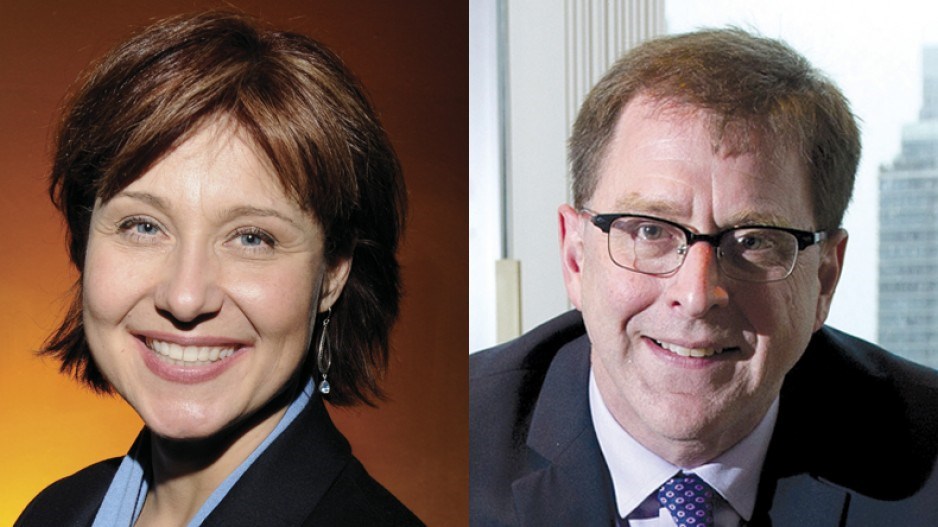Forced to swallow the bitter pill of tax hikes, members of B.C.'s business community appear to prefer the Liberals' shorter dose to the NDP's prescription for permanent, higher and more wide-ranging increases.
The two parties have both promised to raise corporate and high-earner personal income taxes (see sidebar); the Liberals would lower the tax rate for small business.
Jock Finlayson, Business Council of BC vice-president, told Business in Vancouver that the timing of the increases isn't helpful for business, given that it comes on the heels of the return to the PST.
"The switch back to the PST is actually the biggest tax increase on business in the province's history," said Finlayson.
The return to the PST is also top of mind for small-business owners. The Canadian Federation of Independent Business (CFIB) is lobbying to make the tax more efficient.
"Now with the PST and with some of the recent tax increases, B.C. has the highest tax on investment … In the long term, it's going to make small businesses in B.C. uncompetitive," said Mike Klassen, B.C. director of the CFIB.
Klassen said a recent survey showed that B.C. business owners weren't expecting their issues to get much play during the election campaign. He's been pleasantly surprised by the NDP's promise not to raise small business tax rates, and the Liberals' commitment to drop the tax rate to 1.5%.
"These are good signs," said Klassen, "and we were also pleased to see the Liberals are speaking on issues small business has made a top priority for them, which is debt reduction and balancing the budget."
Finlayson said there is a real threat that both parties' proposed tax increases could make B.C.'s business environment less competitive, especially considering the province's neighbours – Alberta and Washington state – have low corporate and income tax rates.
Alberta's corporate tax rate is 10%, and it has a flat income tax rate of 10%. Washington has no corporate or income tax, but it has a business and occupation tax.
"Ontario's in a different situation," said Finlayson. "Their neighbours are Quebec, which has the highest [combined] taxes in North America, and New York, which is a high-tax state."
Iain Black, Vancouver Board of Trade (VBOT) president, said he's hearing the most concern about the rise in income tax for those earning more than $150,000 a year. VBOT members are calling the change "alarming," said Black.
"Those are the people who in turn create the $50,000, $60,000 and $70,000 jobs. Those are the employers that will be affected by the income tax hike."
Finlayson echoed Black's concerns, while acknowledging the effect would be gradual.
"It creates an incentive, if you're a corporation operating in British Columbia, you might be inclined to have more of your senior management personnel based in Alberta," he suggested.
Corporate tax hikes are more likely to have an effect on business than income tax increases, said Steeve Mongrain, a professor of economics at SFU who specializes in taxation.
"If we add an additional 1% [to the corporate tax rate], we're going to be a lot less competitive with other provinces," said Mongrain. "It depends on the industry, but we saw it in terms of the movie industry. We're engaged in a quite ferocious tax war between Quebec, Ontario and B.C."
He said it was less likely the proposed income tax increases would push high earners to move to another jurisdiction.
"Someone who makes $200,000, it will mean about $1,000 difference in the end," said Mongrain of the NDP's plan. "It's really hard to believe that that would be the primary reason a person decides to move." •
Tale of corporate tax rates
In 2001, a newly elected Liberal government reduced B.C.'s corporate tax rate to 13.5% from 16%. By 2008, the rate stood at 12%. Between 2008 and 2011, the government cut the tax further in stages, part of making the newly introduced carbon tax revenue neutral. In 2011, the rate was changed to 10%, making it one of the lowest in Canada.
Tale of small-business tax rates
In his 2009 election campaign, then-premier Gordon Campbell promised to scrap the 2.5% small business tax. But in 2011, facing mounting public opposition to the HST, the newly appointed Christy Clark said the elimination of the small business tax would be postponed.
Clark's latest election platform has promised a small-business tax rate reduction to 1.5%, from its current 2.5%, to be in place in 2017-18.




